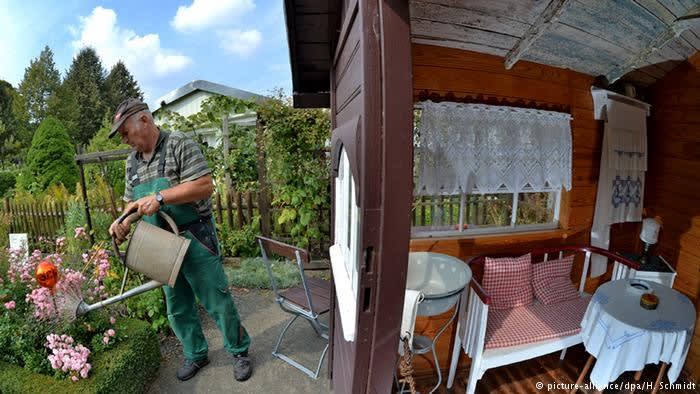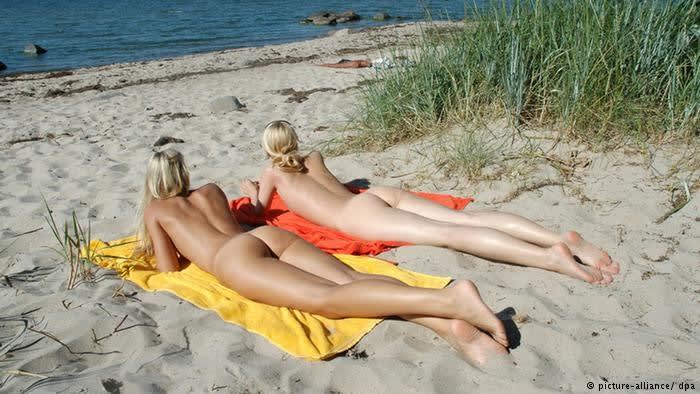2017年6月1日(Thu.) 早いもので6月を迎えました。 振り返れば、森友問題や問題ある共謀罪、はたまた、加計問題・・・、一体、有意義な国会審議時間はあったのでしょうか、まるで空転状態。 他にもっと優先すべき事項が一杯あるのではないかと思います。
さて、ドイツ人の気質を示すかのような話題が出ていますので、その中の半分ぐらいを転載します。 ( ニュースソース: DW-DE 5月31日発 )
<原文の一部>
10 very German passions
Admittedly, not all Germans are deeply enthusiastic about these cultural habits - but you shouldn't be surprised if you meet one who is.
これらの文化的習慣に熱狂しているのは全てのドイツ人とは言えないのですが、もし、こうした光景を見かけたとしても驚かないようにして下さい。

1.Beer
It's a cliché, so might as well get it out of the way: Only the Czechs drink more beer on average than the Germans. It's not that every German likes beer, but it's just so socially established. An older woman drinking a pint at noon will not be seen as an alcoholic. And any German beer fan knows extremely creative methods to open a beer bottle without an opener.
(抜粋)ビール: ありきたりのことですが、これから片付けておきましょう。 チェコ人だけがドイツ人よりも平均としてビールを多くの飲んでいます。 全てのドイツ人がビール好きと言うわけではありませんが、社会的に定着しています。 年配の婦人がお昼に1パイント(およそ500mml)のビールを飲んでいてもアル中ではありません。 そして、ドイツ人のビールファンは、いずれもオープナーなしでボトルの栓を開ける方法を知っているものです。

2.Paperwork
The binder is a German invention, and this might help explain why Germans are so fond of keeping their records. Yet even the most chaotic person will quickly find out that keeping any official document is a necessity in Germany. You actually need them more often than you'd think. Despite digitalization, German bureaucracy also remains surprisingly reliant on good-old paper forms - stacks of them.
(抜粋)事務: バインダーはドイツ人による発明品です。 そして、このことは何故ドイツ人が記録を保存しておくことが好きであるかの説明になります。 はなはだ整理の悪い人物であったとしても、速やかに事務書類を見つけ出すことができるのです。 これは思ったよりも必要とされることなのです。 デジタル化が進んでいるとは言え、ドイツ官僚はこうした古き良きペーパー形式に驚くほど頼っています。

3.Schrebergärten - garden colonies
The Germans who prefer to stay in the city throughout the summer might be doing so because they have a garden in one of the country's 1.4 million "Schrebergärten," which are colonies divided into plots with a little shack. There, they can work on their flowerbeds, barbecue or line up garden gnomes. Germany, however, strictly regulates these allotments, and each colony also has its own rules.
(抜粋)小菜園: ドイツ人は夏の間を通して街に留まることを好みます。 何故なら、全国で140万区画にも及ぶ小菜園を保有しているからです。 これらは小さく区割りされたもので小屋もあるのです。 そこでは、花壇を手入れしたり、BBQをしたり、人形なども並べます。 但し、こうした区割り(菜園)には、それぞれの厳格なルールなどもあります。

4.FKK
The German nudist movement was the first worldwide, developing at the end of 19th century through clubs promoting "Freikörperkultur," or FKK, which translates as Free Body Culture. It became especially widespread in former East Germany, and not only in nudist camps. To this day, you shouldn't be surprised to see naked people in parks or around lakes in the eastern part of Germany.
(抜粋)FKK: ドイツのヌーディスト運動は世界で初のもので、"Freikörperkultur," (FKK)として19世紀末に開始されました。 特に東ドイツで広まったもので、ヌーディスト・キャンプだけではありませんでした。 今日に至っては、ドイツ東部では公園や湖の周辺などでも裸の人々を見かけますが驚かないで下さい。

5.Road rules
As an adult, you may feel you can take your own risk and cross on a red light when there aren't any cars. However, in Germany, you shouldn't be surprised if you hear someone yelling at you: "It's RED!" Often, cyclists, pedestrians and car drivers all feel the need to "educate" their fellow road users.
(抜粋)道路でのルール: 大人として、車が通っていなければ赤信号でも自分自身の責任において渡ることができます。 しかし、ドイツでは、誰かが "It's RED!" と叫ぶことがしばしばあります、驚かないで下さい。 サイクリストも歩行者もカードライバーも道路利用者である友人の教育が必要と感じています。
***
なかなか、面白い内容でした。 ドイツ人の習慣や気質の一部を表しているのかも知れませんね。 ちなみに、小菜園はクライン・ガルテンとかシュナイダー・ガルテンとも言われていますし、小屋はラウベ・・・。 当ブログのドイツ滞在記編でも登場しています。
また、庭に人形を配置するのは、2013年のドイツで滞在した農場の庭にもありました。 その時の写真も掲載しておきます(こちらは広い庭です)。




*
ものまねは好ましくないかも知れませんが、良いところに学ぶ精神は尊重したいものです。 同じことをするにしても、動機・目的が不純であれば、その行為は許せるものではありませんが・・・。
それにしても、ことの善悪の判断は、誰にでも出来ることと思いたいのですが、できない人もいるようですね、政権中枢部にも・・・。
*** 下の写真は、記事内容とは関係ありません。

***
さて、ドイツ人の気質を示すかのような話題が出ていますので、その中の半分ぐらいを転載します。 ( ニュースソース: DW-DE 5月31日発 )
<原文の一部>
10 very German passions
Admittedly, not all Germans are deeply enthusiastic about these cultural habits - but you shouldn't be surprised if you meet one who is.
これらの文化的習慣に熱狂しているのは全てのドイツ人とは言えないのですが、もし、こうした光景を見かけたとしても驚かないようにして下さい。

1.Beer
It's a cliché, so might as well get it out of the way: Only the Czechs drink more beer on average than the Germans. It's not that every German likes beer, but it's just so socially established. An older woman drinking a pint at noon will not be seen as an alcoholic. And any German beer fan knows extremely creative methods to open a beer bottle without an opener.
(抜粋)ビール: ありきたりのことですが、これから片付けておきましょう。 チェコ人だけがドイツ人よりも平均としてビールを多くの飲んでいます。 全てのドイツ人がビール好きと言うわけではありませんが、社会的に定着しています。 年配の婦人がお昼に1パイント(およそ500mml)のビールを飲んでいてもアル中ではありません。 そして、ドイツ人のビールファンは、いずれもオープナーなしでボトルの栓を開ける方法を知っているものです。

2.Paperwork
The binder is a German invention, and this might help explain why Germans are so fond of keeping their records. Yet even the most chaotic person will quickly find out that keeping any official document is a necessity in Germany. You actually need them more often than you'd think. Despite digitalization, German bureaucracy also remains surprisingly reliant on good-old paper forms - stacks of them.
(抜粋)事務: バインダーはドイツ人による発明品です。 そして、このことは何故ドイツ人が記録を保存しておくことが好きであるかの説明になります。 はなはだ整理の悪い人物であったとしても、速やかに事務書類を見つけ出すことができるのです。 これは思ったよりも必要とされることなのです。 デジタル化が進んでいるとは言え、ドイツ官僚はこうした古き良きペーパー形式に驚くほど頼っています。

3.Schrebergärten - garden colonies
The Germans who prefer to stay in the city throughout the summer might be doing so because they have a garden in one of the country's 1.4 million "Schrebergärten," which are colonies divided into plots with a little shack. There, they can work on their flowerbeds, barbecue or line up garden gnomes. Germany, however, strictly regulates these allotments, and each colony also has its own rules.
(抜粋)小菜園: ドイツ人は夏の間を通して街に留まることを好みます。 何故なら、全国で140万区画にも及ぶ小菜園を保有しているからです。 これらは小さく区割りされたもので小屋もあるのです。 そこでは、花壇を手入れしたり、BBQをしたり、人形なども並べます。 但し、こうした区割り(菜園)には、それぞれの厳格なルールなどもあります。

4.FKK
The German nudist movement was the first worldwide, developing at the end of 19th century through clubs promoting "Freikörperkultur," or FKK, which translates as Free Body Culture. It became especially widespread in former East Germany, and not only in nudist camps. To this day, you shouldn't be surprised to see naked people in parks or around lakes in the eastern part of Germany.
(抜粋)FKK: ドイツのヌーディスト運動は世界で初のもので、"Freikörperkultur," (FKK)として19世紀末に開始されました。 特に東ドイツで広まったもので、ヌーディスト・キャンプだけではありませんでした。 今日に至っては、ドイツ東部では公園や湖の周辺などでも裸の人々を見かけますが驚かないで下さい。

5.Road rules
As an adult, you may feel you can take your own risk and cross on a red light when there aren't any cars. However, in Germany, you shouldn't be surprised if you hear someone yelling at you: "It's RED!" Often, cyclists, pedestrians and car drivers all feel the need to "educate" their fellow road users.
(抜粋)道路でのルール: 大人として、車が通っていなければ赤信号でも自分自身の責任において渡ることができます。 しかし、ドイツでは、誰かが "It's RED!" と叫ぶことがしばしばあります、驚かないで下さい。 サイクリストも歩行者もカードライバーも道路利用者である友人の教育が必要と感じています。
***
なかなか、面白い内容でした。 ドイツ人の習慣や気質の一部を表しているのかも知れませんね。 ちなみに、小菜園はクライン・ガルテンとかシュナイダー・ガルテンとも言われていますし、小屋はラウベ・・・。 当ブログのドイツ滞在記編でも登場しています。
また、庭に人形を配置するのは、2013年のドイツで滞在した農場の庭にもありました。 その時の写真も掲載しておきます(こちらは広い庭です)。




*
ものまねは好ましくないかも知れませんが、良いところに学ぶ精神は尊重したいものです。 同じことをするにしても、動機・目的が不純であれば、その行為は許せるものではありませんが・・・。
それにしても、ことの善悪の判断は、誰にでも出来ることと思いたいのですが、できない人もいるようですね、政権中枢部にも・・・。
*** 下の写真は、記事内容とは関係ありません。

***









